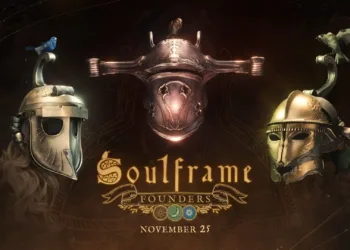In the mist-shrouded lands of Tainted Grail: The Fall of Avalon, few side quests capture the game’s haunting atmosphere quite like “I See a Darkness.” This enigmatic journey begins innocuously enough—a strange illness plaguing a small village—but quickly descends into a nightmarish exploration of ancient beings, moral dilemmas, and the thin veil between dreams and reality. As you traverse the Horns of the South region, this quest stands as a perfect microcosm of what makes Tainted Grail so compelling: a blend of Arthurian legend, Celtic mythology, and dark fantasy that challenges players to make consequential choices in a world where nothing is as straightforward as it seems.
The quest’s brilliance lies in how it transforms from a simple investigation into a supernatural plague into a profound meditation on mercy, sacrifice, and the sometimes blurry line between monsters and men. Whether you’re a seasoned adventurer or just beginning your journey through Avalon’s twisted landscapes, “I See a Darkness” offers a glimpse into the game’s soul—where ancient horrors lurk beneath everyday struggles, and where your decisions echo far beyond their immediate consequences.
Table of Contents
Finding Betrys: Where Your Journey into Darkness Begins
Your first step into this haunting quest begins in the Village near the fortress in the Horns of the South region. As you approach, the scene immediately sets an ominous tone—a man named Col locked in a cage, seemingly lost to some strange affliction, while a woman named Betrys stands nearby with worry etched across her face.
When you speak with Betrys, she reveals the troubling situation: a mysterious disease has taken hold in the village. What began with a single refugee has now spread to affect even the fortress guards, known as Keepers. The illness manifests as a strange trance-like state, leaving its victims conscious but unresponsive—trapped in their own bodies.

Betrys believes there’s more to this plague than meets the eye. She suspects supernatural forces at work and asks for your help in investigating its source. If you agree to assist her, the quest officially begins, and she directs you to a campsite near King’s Road where the refugee first showed symptoms.
The campsite isn’t difficult to find—it’s located just north of the fortress, and you can easily reach it on horseback by following the quest marker. This seemingly simple task of visiting a campsite is your first step into a much darker journey that will test both your combat skills and moral compass.
The Dream Realm: Confronting Abhartach
Upon reaching the campsite, you’ll immediately notice it’s not abandoned. A Wyrdspawn—one of the twisted creatures born of the magical corruption plaguing Avalon—has made this place its temporary home. Dispatch this creature first to secure the area.
With the immediate threat eliminated, you’ll need to set up a bonfire at the campsite. This isn’t just for safety—it’s a crucial step in your investigation. Once the fire is crackling, approach the sleeping mat nearby and rest. What happens next transcends the physical world entirely.
As you sleep, you awaken in what can only be described as a nightmare version of reality—the dream realm. This twisted landscape serves as a bridge between worlds, allowing communication with entities that exist beyond normal perception. Follow the eerie voice calling to you through this surreal environment.
The path leads to a deep pit where you’ll encounter one of the quest’s most memorable characters: Abhartach, an ancient being from a race known as the Fore-Dwellers. Chained and imprisoned for countless years, this creature presents itself as both victim and potential savior.
| Abhartach Encounter Options | Immediate Outcome | Reward |
|---|---|---|
| Allow him to bite you | He dies instantly from your “poisonous” blood | Fore-Dweller’s Bauble |
| Refuse his request | Brief combat encounter before he collapses | Fore-Dweller’s Bauble |
Abhartach claims he can cure the afflicted villagers if you allow him to taste your blood—just one bite, he insists. This moment presents the quest’s first major moral dilemma. Do you trust this ancient, imprisoned entity? Or do you refuse his strange request?
If curiosity gets the better of you and you allow him to bite you, the outcome is unexpected—Abhartach immediately collapses, poisoned by your blood. He dies on the spot, and you can loot his body to obtain the Fore-Dweller’s Bauble, a magical item that will prove useful in your adventures.
Should you refuse his request, Abhartach becomes enraged and attacks you. However, this “boss fight” is surprisingly anticlimactic—he manages only a single swing before collapsing from exhaustion. You can then finish him off and still obtain the same Fore-Dweller’s Bauble from his body.
While the gameplay outcome is identical regardless of your choice, the narrative implications differ. Your decision reflects your character’s approach to the unknown—are you willing to take risks and offer yourself as a potential sacrifice? Or do you maintain caution when dealing with ancient, imprisoned entities?

Returning to Betrys: The Final Moral Choice
After your encounter with Abhartach in the dream realm, you’ll return to the waking world with the Fore-Dweller’s Bauble in your possession. This magical artifact appears to have some connection to the mysterious illness, as you’ll discover when you return to Betrys in the village.
Upon your return, Betrys shares some good news—one of the Keepers, Mahon, has begun to recover from the strange affliction. Your journey into the dream realm and confrontation with Abhartach seems to have weakened the supernatural hold on at least some of the victims.
However, not everyone has been so fortunate. Col, the man you first saw locked in the cage, remains completely unresponsive. His condition appears unchanged, leaving him in a living death—conscious but unable to interact with the world around him.
This leads to the quest’s second significant moral decision, one that tests your character’s compassion and pragmatism. If your character has invested in the Spirituality stat (which governs persuasion in matters of faith and the supernatural), you can attempt to convince Betrys that ending Col’s suffering would be an act of mercy.
| Final Choice Options | Requirement | Outcome | Reward |
|---|---|---|---|
| Persuade Betrys to let you end Col’s suffering | High Spirituality stat | Col dies peacefully | Additional gold and XP |
| Fail persuasion or choose not to try | Low Spirituality or player choice | Col remains in his condition | No additional reward |
If you succeed in persuading Betrys, she reluctantly agrees that Col’s current existence is no life at all. She asks you to handle the matter discreetly, suggesting you return at night to end his suffering quietly. Completing this final act of mercy rewards you with additional gold and experience points.
Should you fail the persuasion check or choose not to attempt it, the quest concludes with Col remaining in his unresponsive state. While this might seem like the more humane choice to some players—not taking a life—the game presents his continued existence as potentially cruel, trapped as he is in his own body.
This final choice exemplifies Tainted Grail’s nuanced approach to morality. There is no clearly “good” or “evil” option—only difficult choices with consequences that reflect your character’s values and worldview.
Strategic Insights: Maximizing Your Experience
While “I See a Darkness” is primarily a narrative-focused quest, there are several strategic considerations that can enhance your experience and rewards:
- Invest in Spirituality: If you’re planning a character build that will engage deeply with the game’s narrative choices, consider investing points in the Spirituality stat early on. This not only unlocks persuasion options in this quest but in many others throughout the game.
- Combat Preparation: The Wyrdspawn at the campsite and the brief encounter with Abhartach (if you refuse his request) are relatively easy combat challenges, but it’s still wise to ensure your health and equipment are in good condition before starting the quest.
- Exploration Rewards: The areas you’ll visit during this quest, particularly around the Village and the campsite near King’s Road, contain additional resources and items worth collecting. Take time to explore thoroughly.
- The Fore-Dweller’s Bauble: This magical item obtained from Abhartach has useful properties that can aid you in other quests. Be sure to examine it in your inventory to understand its benefits.
- Narrative Consequences: While this quest’s choices don’t dramatically alter the game’s main storyline, they do contribute to your character’s development and may be referenced in subtle ways in later conversations.

The Deeper Meaning: Themes and Symbolism
“I See a Darkness” exemplifies the rich thematic depth that makes Tainted Grail: The Fall of Avalon stand out among RPGs. The quest’s title itself references not just literal darkness but the metaphorical shadows that cloud understanding and judgment.
The mysterious illness that leaves victims conscious but unresponsive serves as a powerful metaphor for helplessness and the horror of being trapped within oneself—a fear that resonates on a primal level. This condition mirrors the game’s broader themes of agency and choice in a world where forces beyond human comprehension often dictate fate.
Abhartach, as one of the ancient Fore-Dwellers, represents the lingering influence of the past on the present. His request for blood—a single bite—evokes vampire mythology but subverts it by making him vulnerable to the very thing he seeks. This reversal speaks to the game’s recurring motif of power dynamics and how they can unexpectedly shift.
The dream realm itself is significant, serving as a liminal space where boundaries between reality and fantasy, past and present, blur. This reflects the game’s overall setting—Avalon as a land caught between historical reality and mythological fantasy, where Arthurian legends and Celtic folklore intertwine with human struggles.
Finally, the quest’s conclusion forces players to confront questions about mercy, suffering, and the value of life—themes that resonate throughout Tainted Grail’s narrative. Is it more compassionate to end suffering or to preserve life at all costs? The game offers no easy answers, only the opportunity for players to express their own values through their choices.
How to Get Fortnite on iPhone in the EU: The Complete 2025 Guide for Gamers
FAQs
How does the Spirituality stat affect other quests in Tainted Grail: The Fall of Avalon?
The Spirituality stat in Tainted Grail: The Fall of Avalon extends far beyond its application in the “I See a Darkness” quest. Throughout your journey across Avalon, this attribute governs your character’s connection to the supernatural elements of the world and their ability to persuade others in matters of faith, belief, and the metaphysical. Players with high Spirituality gain access to unique dialogue options when interacting with religious figures, mystics, and those affected by Wyrdness. This can unlock alternative quest solutions, hidden information, and occasionally entire questlines that remain invisible to characters with low Spirituality.
Additionally, this stat influences your effectiveness with certain magical items and rituals, allowing for more powerful effects or reduced costs. For players interested in exploring the deeper mystical aspects of Avalon’s lore, investing in Spirituality creates a richer narrative experience by revealing layers of the world that remain hidden to more pragmatic or combat-focused character builds.
What is the significance of the Fore-Dweller’s Bauble obtained from Abhartach?
The Fore-Dweller’s Bauble obtained from Abhartach is more than just a quest reward—it’s an artifact with both practical utility and significant lore implications. This ancient relic provides a passive bonus to your character’s resistance against Wyrdness effects, making it particularly valuable when exploring heavily corrupted areas of the map. When equipped, it occasionally reveals hidden pathways or objects that would otherwise remain invisible, particularly in areas with strong connections to the dream realm.
From a lore perspective, the Bauble represents a tangible connection to Avalon’s pre-human history, when the Fore-Dwellers walked the land before the arrival of humans or even the mythical figures of Arthurian legend. Scholars and mystics throughout the game will react with interest if they notice you carrying this item, sometimes offering additional insights into its origins or suggesting other locations where similar artifacts might be found. While its immediate effects may seem modest, the Bauble’s true value lies in how it connects your character to the ancient mysteries that underpin Avalon’s troubled present, potentially influencing events and revelations in the later stages of your journey.








